Best RPC Node Providers 2025: The Practical Comparison Guide

Vance Wood
November 6, 2025
15 min read

Remote procedure call (RPC) nodes form the backbone of Web3 applications. They ensure that all decentralized apps (dApps) and services function properly and deliver value to people. All of them rely on RPC calls sent to the blockchain via RPC nodes, and if the connection is broken, everything will shut down.
Here, we’ll review GetBlock’s strongest and most viable competitors—and, while we cannot know them as well as we know ourselves, we’ll try to keep an open mind and use all available analytics data. Feel free to contact us if you think we’ve missed something, and happy reading!
Best RPC node providers 2025: Full list
Here are RPC providers that you might know something about:
GetBlock
Alchemy
QuickNode
Infura
Ankr
Chainstack
Helius
dRPC
Tatum
Tenderly
Blockdaemon
Triton
Nodereal
Lava
Nirvana Labs
NOWNodes
Infstones
POKT Network
Here, we'll focus on eight market leaders, which are the first eight in the list. Of course, it includes our own product, which, we believe, has earned its place among the best ones—and we’ll share our reasons for that soon.
But for now, let’s start by defining an RPC provider and see why business needs them.
What is an RPC node provider
Every Web3 application connects to the blockchain and uses its methods to send transactions, execute contracts, mint tokens, and record data. To establish a connection and use blockchain methods, applications need to send an RPC request, which is processed by an RPC node of a particular blockchain.
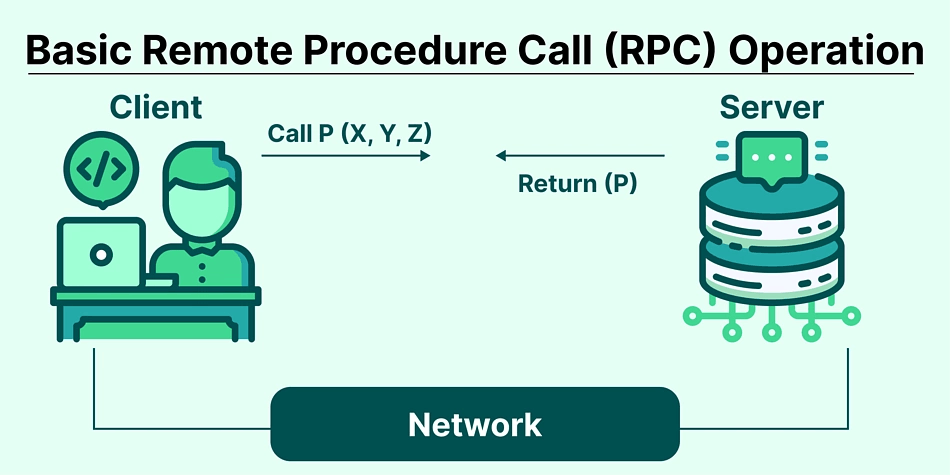
Blockchain provider is a service that offers RPC nodes, usually on a subscription basis or using a pay-as-you-go model. Developers and entrepreneurs can order a node, pay a subscription fee, and connect using an RPC API endpoint, which gives them competitive advantages.
They don’t need to set up and maintain their own node, which is usually time- and money-consuming
They can use additional tools and services of an RPC provider to customize their node for specific tasks, such as staking or token minting
The node provider’s DevOps and tech support teams can solve shutdowns and other issues without disruptions
The node provider usually helps with the project development and promotion, which adds to its benefits
Large companies with tremendous capacity, like Google and Amazon, have recently entered this market, too, highlighting its potential. Let’s explore the business demand that has driven their rise and the metrics that are crucial to them.
Business demand
Setting up and managing own RPC nodes is a crucial requirement for any dApp developer, and it consumes time and money. Therefore, it’s a pain that must be solved by other business players, and that’s where RPC node providers come in.
Read more about RPC and the role of node providers here
They offer a perfect solution for commercial projects, when a business needs a personalized infrastructure deployment and maintenance as a ready product, so they can continue their business operations without disruptions.
Centralization issues
One can note that the fact that decentralized applications rely on centralized infrastructure providers may go against the idea of a decentralized and self-managing Web3 community. That’s true, and that’s where business efficiency and centralization issues must be balanced.
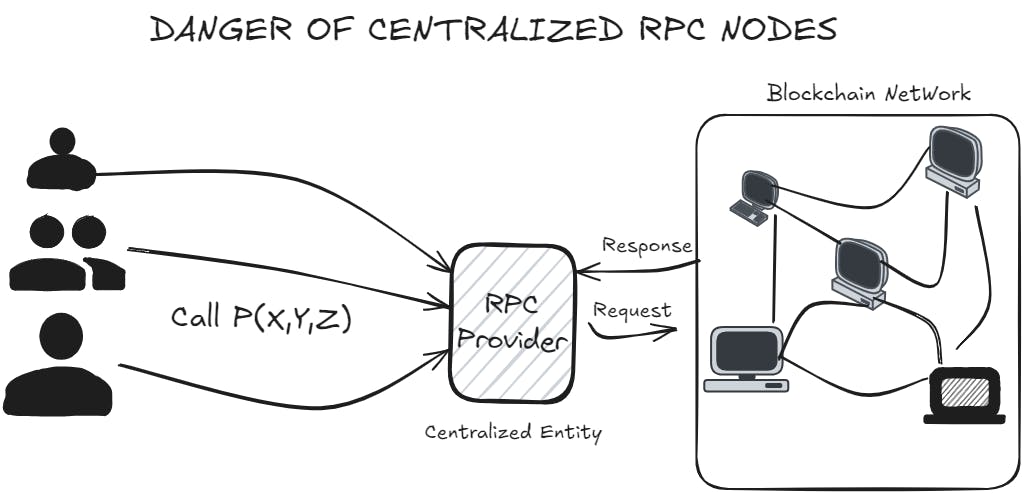
Source: HackerNoon
Centralization issues include:
Single failure point, which means that if a centralized RPC server is down, all dApps relying on it are down, too.
Dependency risks, as centralized entities can manipulate access, for example, denying services to specific IPs and locations.
Scalability problems, which arise when several users connect to a single RPC server, limit its performance greatly.
RPC providers mentioned here address centralization in various ways, usually offering various servers to avoid a single failure point. Among others, Infura and dRPC connect with independent node providers to encourage decentralization, while Ankr uses its own token for governance, allowing its community holders to direct the project’s development.
How we ranked the best RPC providers
It’s too tempting to focus solely on the current popularity of RPC providers. While it reflects their ability to meet customer needs and must be taken into account, it’s too abstract and variable to be the only metric that matters.
Core metrics we considered
So, instead of focusing on popularity alone, we considered several technical metrics that can be evaluated using benchmark testing and open-source performance tracking tools. Let’s explore these metrics closely.
Cost-efficiency is determined by the provider’s pricing policy.
Security tools include MEV-protection, private mempools, and others.
Chainlist means the range of blockchains for which RPC nodes are available.
Geo distribution shows available server locations: the closer they are, the better.
Latency is how quickly the node sends and receives data; the lower it is, the better.
Uptime determines the percentage of time when the node is operating and not down.
RPC success rate shows the percentage of successful RPC requests sent via the node.
Among technical metrics, latency and uptime are among the most important, as they directly show the performance of the provider’s node.
Important: RPC service pricing is usually measured in CU (compute unit) usage (or API credits for QuickNode and Ankr), which determines the computational resources needed to proceed with a specific blockchain method. For example, you can explore how many GetBlock compute units are needed for every method, but keep in mind that these numbers can vary for every provider.
Best 8 RPC providers: Comparison table
Below is a table of the most basic, easy-to-check data, and latency is among the most important. Latency variations are significant and depend on the overall network load and the client–server distance. For dRPC, it cannot be measured properly at all, as it relies on the vast network of RPC providers, each with different characteristics.
RPC provider | Pricing (starting) | MEV protection | Available chains | Latency | Comment |
GetBlock | $39/mo for 50M CUs | Yes | 100+ | 40–300 ms | Regular community tests |
Alchemy | $5 per 11M CUs | Yes | 70+ | 40–350 ms | Regular community tests |
QuickNode | $42/mo for 80M API credits | Yes (plugin) | 70+ | 50–350 ms | Community and provider tools |
Infura | $50/mo for 15M credits/day | Yes | 20+ (EVM only) | 60–350 ms | Regular independent tests |
Ankr | $10 per 100M API credits | Unclear | 70+ | 80–300 ms | Several community reports |
Chainstack | $49/mo for 20M requests | Yes | 70+ | 60–250 ms | Community and provider tools |
Helius | $49/mo for 10M credits | Yes | 1 (Solana) | 10–80 ms | Regular community tests |
dRPC | $6 per 1M requests | Unclear | 100+ | Varies heavily | Relies on a vast provider network |
With the usage of compute units and API credits, which can have different meanings, pricing numbers can be deceptive.
So far, among the leading blockchain RPC node providers, only Chainstack and dRPC charge directly for blockchain requests. Ohers use lists to specify the cost of each blockchain method in CUs or API credits, and it’s essential to read the provider’s explanations of these numbers. GetBlock also used the request model in the past, but eventually switched to CUs to represent the reality better. For high-performance RPC nodes, it's much better to calculate the cost of every method based on the actual computing cost of this method.
Contact us to know more about our pricing approach—and more.
With this overview, we can proceed further and explore each of the recommended RPC node providers in detail.
Top RPC node providers 2025: Review
Each of the following node providers offers a unique set of services and characteristics that distinguishes it from others and benefits the Web3 ecosystem in its own way. Therefore, let’s explore them and see how they can help.
GetBlock
Simple, efficient, and constantly evolving, GetBlock has cemented its place among the top market players. It offers RPC node services for about 100 chains, and the number is growing steadily. Users can also deploy custom blockchains using the AppChain service.

Source: GetBlock
GetBlock is committed to building a sustainable Web3 ecosystem and offers support for aspiring Web3 projects, helping them with promotion and funding. Its DappHub and partnership programs are excellent starting points for projects to grow and develop.
Alchemy
With a valuation of over $10 billion as of 2022, Alchemy is by far the largest player among the RPC node providers, excluding tech giants like Amazon and Google. It has services for quick dApp, tokens, and NFT deployment and custom rollup creation tools.

Source: Alchemy
Alchemy sees its mission to bring blockchain benefits to as many people as possible, so it has a variety of educational resources and developer tools. It also offers funding and support for promising projects via Alchemy Ventures and a startup accelerator.
QuickNode
Another major market player, QuickNode, offers a variety of plugins and services for different dApp developers, from NFT tools to Web3 analytics services. It has experts on all of these topics and helps with dApp deployment and maintenance.

Source: QuickNode
With a diverse range of plugins and developer tools, QuickNode offers expert services for Web3 builders. Similar to GetBlock and Alchemy, it provides dedicated support for crypto startups, helping them to grow, promote themselves, and find funding opportunities.
Infura
Founded by Consensys and available via the MetaMask Developer dashboard, Infura focuses on EVM networks and allows users to access its available networks with a single API key. It also seeks to solve RPC centralization issues using the DIN (Decentralized Infrastructure Network) approach, connecting with individual node operators.

Source: Infura/MetaMask
Therefore, Infura offers seamless integration with MetaMask services and robust developer tools for dedicated EVM developers
Ankr
Ankr has customized RPC nodes for various tasks, including the rollup-as-a-service toolset for deploying custom L2 rollups. It also offers staking services for various blockchains via its custom liquidity pool.
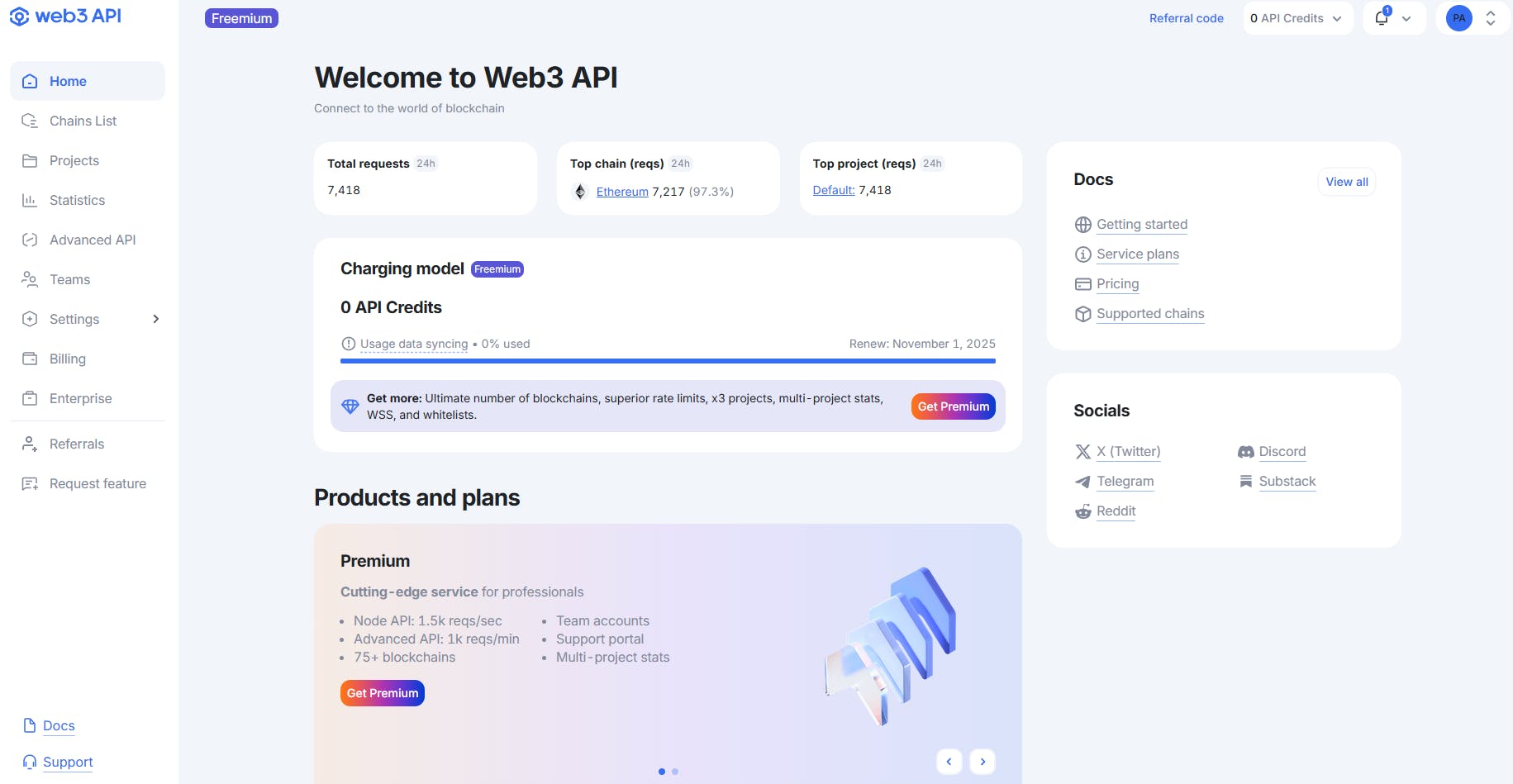
Source: Ankr
Ankr also has its own governance token, which allows its holders to influence how the project will develop in the future and introduce their propositions.
Chainstack
Chainstack also emphasizes different node types for specific tasks, such as trader nodes with a focus on speed, and it also offers a variety of RPC plugins for further customization. It also has a GitHub with project templates, libraries, and SDKs to streamline the development process.
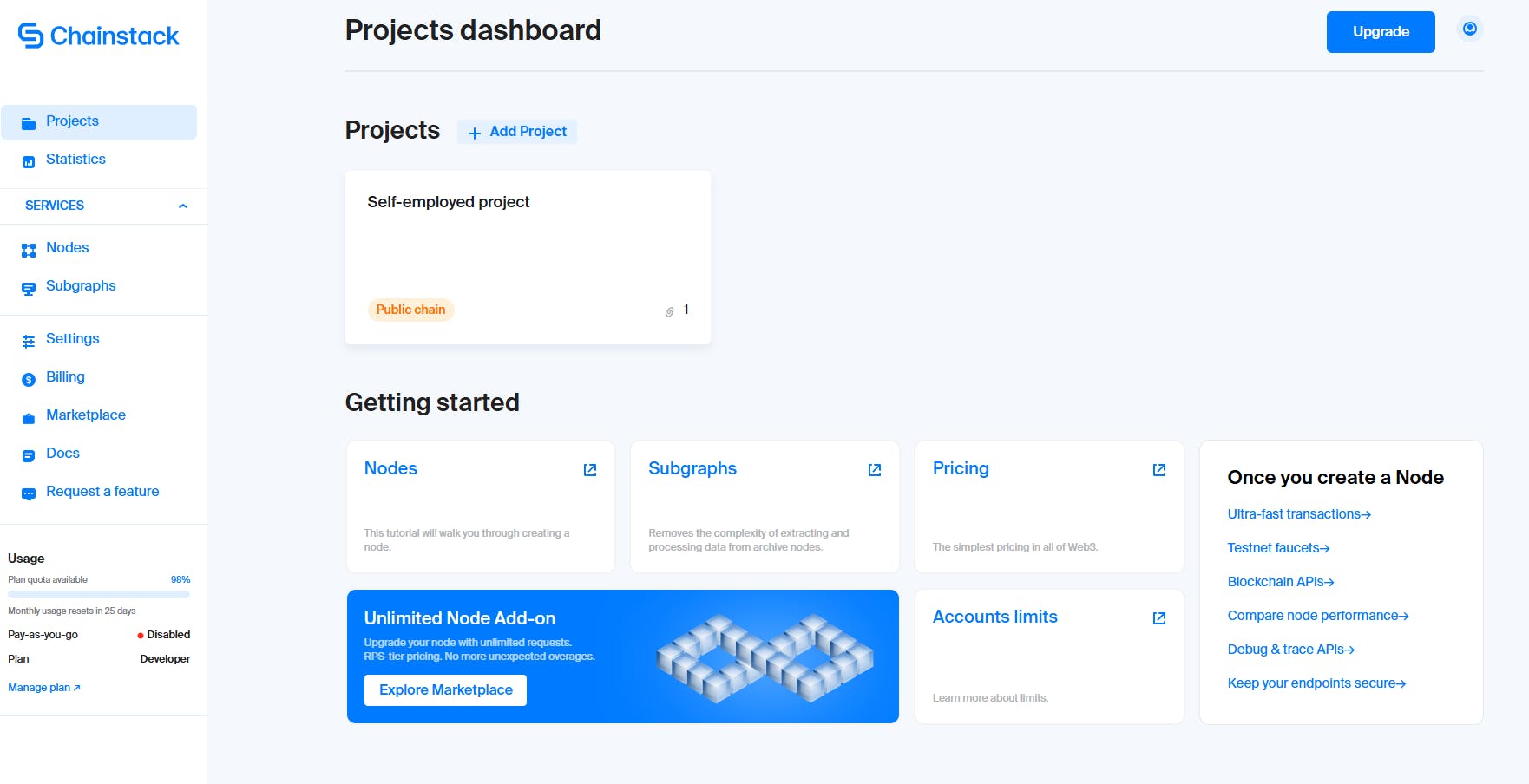
Source: Chainstack
Overall, Chainstack has a robust set of Web3 development tools, SDKs, and libraries.
Helius
Created and maintained by experienced Solana developers, Helius offers a variety of expert-grade tools for Solana, which include very fast RPC nodes, validator-as-a-service, a staking pool with a stable APY, and analytics tools. It also provides concise analytics of the Solana network and publishes research and case studies regularly.
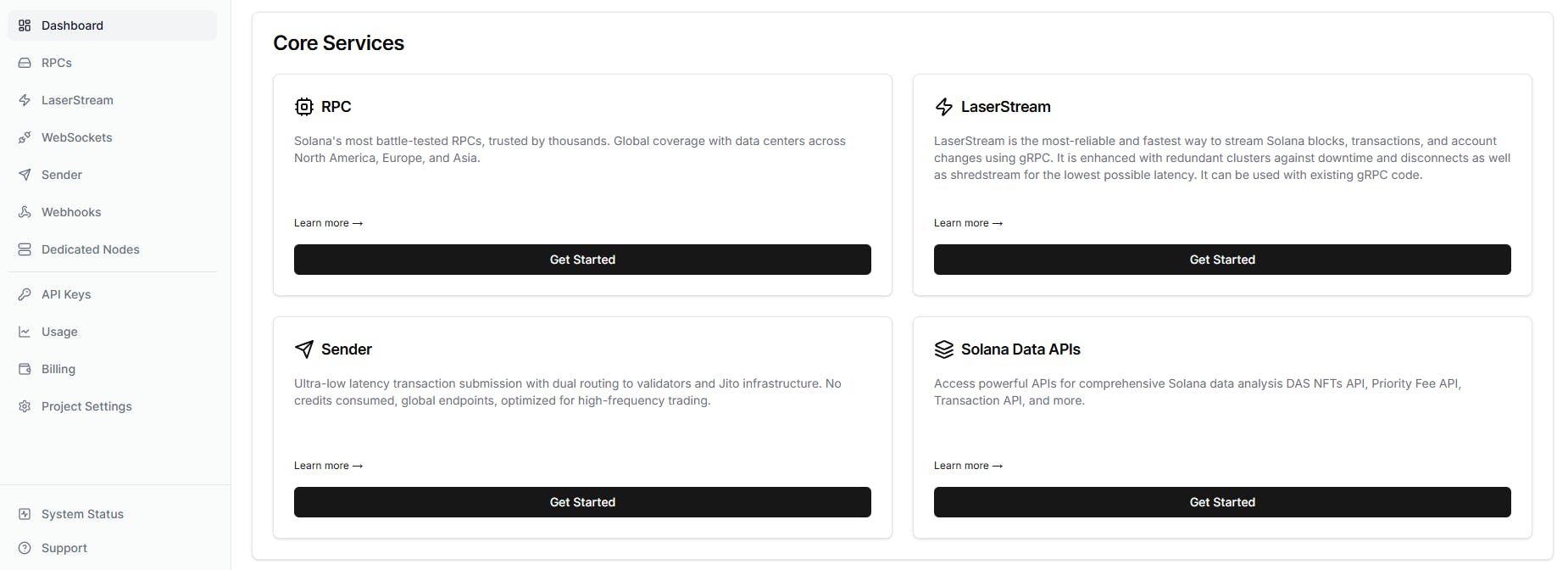
Source: Helius
While Helius' services are limited to Solana, it focuses all its energy on building advanced developer tools and fast RPC nodes for this blockchain.
dRPC
We’ve included dRPC here due to its unique business model that seeks to resolve the centralization issues of RPC providers. Instead of centralized servers, it connects customers with various node operators from different locations.
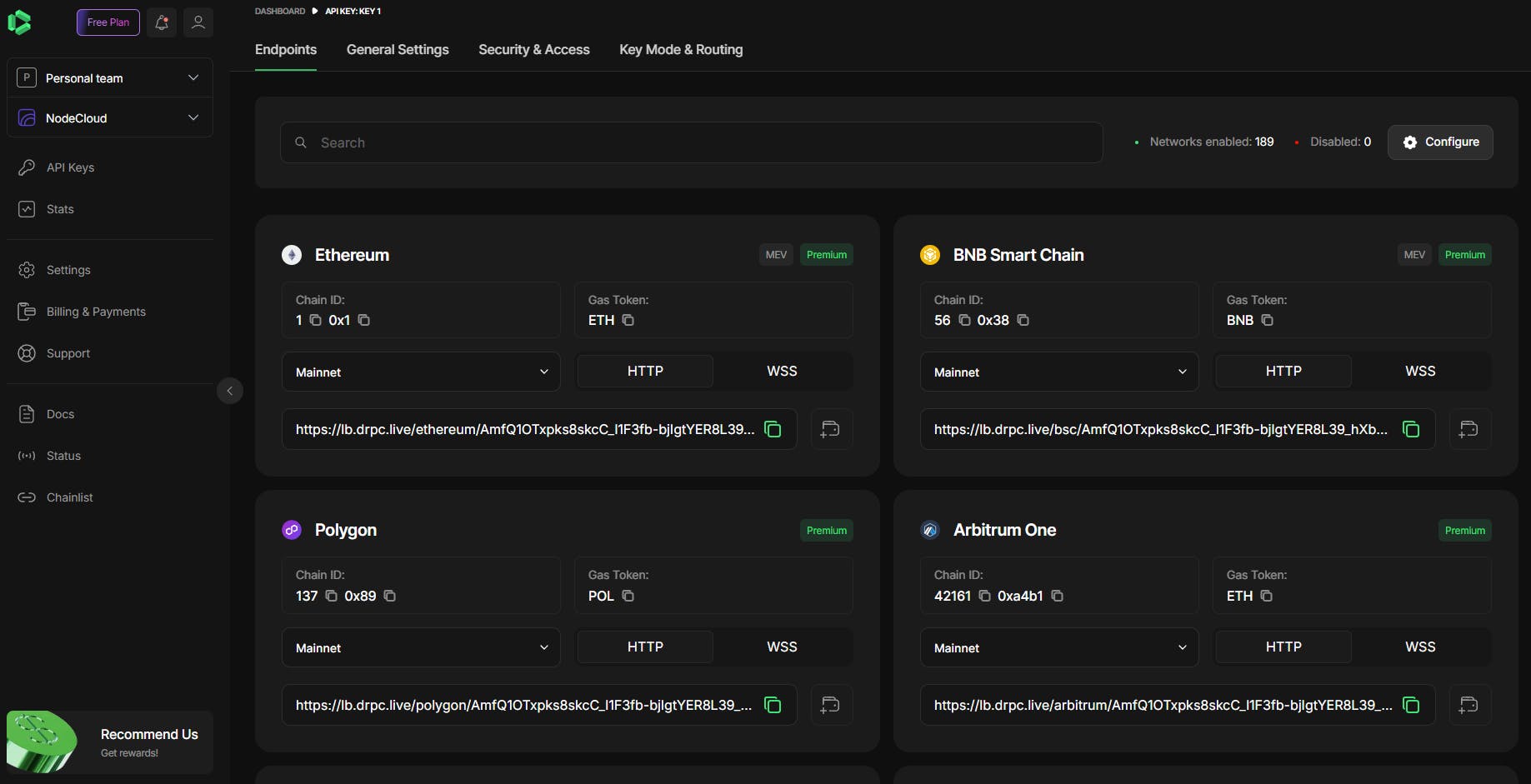
Source: dRPC
By far, it offers the broadest range of available chains (over 150). While it includes lower prices, scalability, flexibility, and a great degree of decentralization, it also leads to great performance and security variations depending on the specific operator. That’s why it’s hard to analyze and evaluate the dRPC node latency, as it varies heavily.
How to choose an RPC provider
While focusing on benchmark testing is beyond the scope of this article, it’s essential to understand the metrics we’ve mentioned, so let’s quickly review them.
Define your requirements
First, determine which metrics are crucial for your tasks. Often, the project that excels in one metric is falling behind in another. For example, Helius reaches very low latency for Solana nodes, but it doesn’t support any other chains. Below are examples of topics worth considering.
Consider your app server’s location to select the closest available RPC server
Analyze which chains you need for your project and which service can provide them
Estimate the maximum latency that you can afford for your project
Consider which additional features you may need, such as MEV protection for your users or specific RPC plugins
After that, you’ll see which metrics you need most, and you can run a benchmark test to evaluate them.
Run a 1-hour benchmark test
An RPC benchmark test is the process of measuring crucial RPC node parameters and is similar to any other connection testing. It can be performed using various applications: among free and open-source ones, Prometheus (with Grafana) and Apache JMeter are well-known.
Usually, the algorithm for testing will be as follows:
The benchmark app sends blockchain requests during the measurement time (1 hour)
All parameters, such as latency, error rate, and uptime, are recorded
The data are visualized, so you can read them and compare them properly
Additionally, you can use the CompareNodes service that monitors node performance constantly and provides this data for free. All popular node providers have their profile here, open for latency monitoring on various chains and regions.
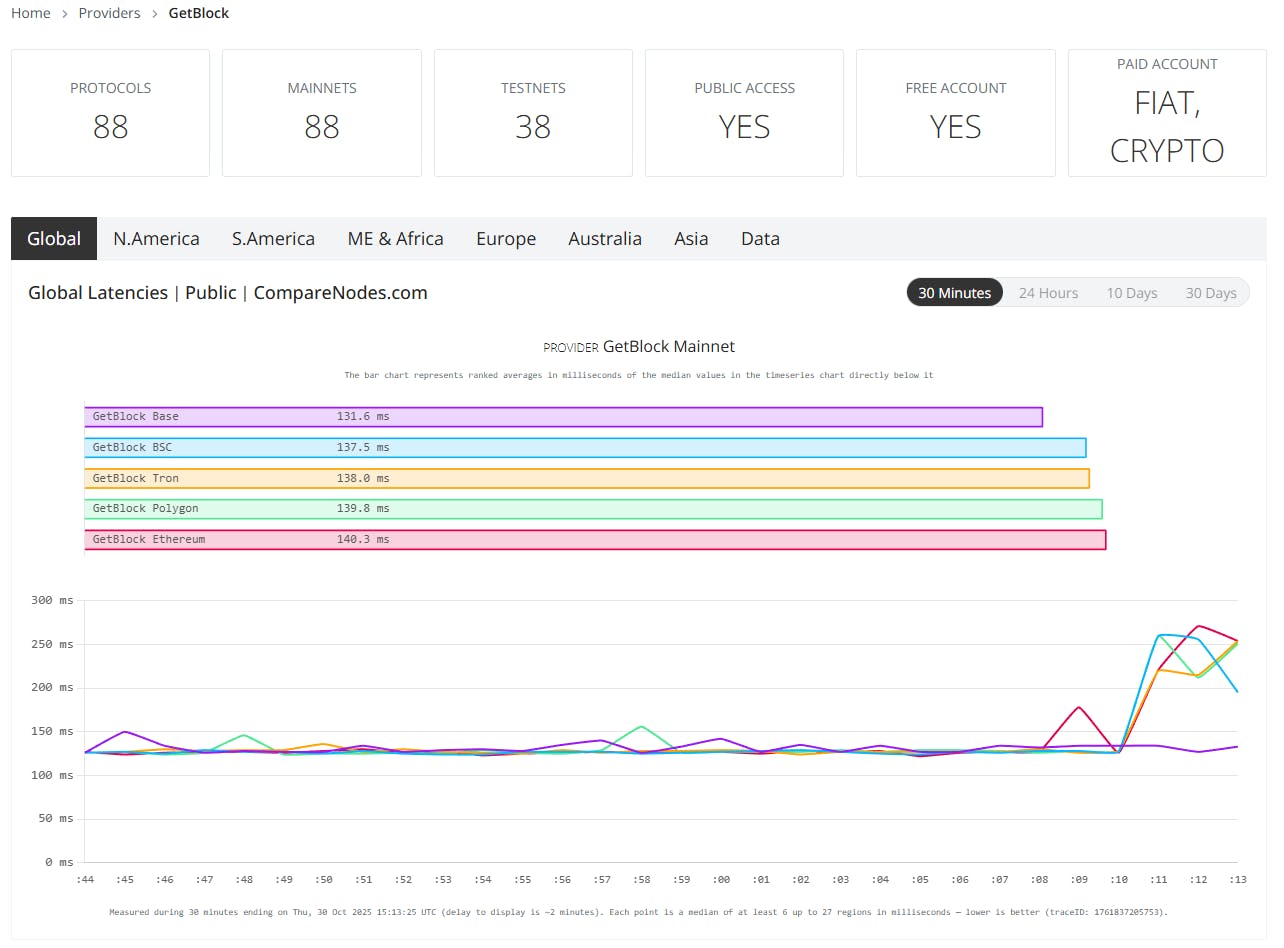
Source: CompareNodes, GetBlock profile as of 30 November 2025
As mentioned, this article isn’t focusing on benchmark tests. However, this is an essential topic for exploring which RPC node provider suits you best. We’ll certainly review this method in our future articles. For now—write to us directly to know more about performance testing.
How to choose the best RPC provider for your blockchain app
To conclude, here is a quick list of what to consider when choosing a node provider.
Where will you launch your app? Choose the RPC node provider with the servers closest to your own servers to minimize latency.
Who will use your application? Depending on whether it will be a service for trading, DeFi, or social interactions, you'll need different blockchain methods and node settings.
Pay attention to the service's technical support and documentation. They will be your work partners, not just providers, so it's best to think about it this way.
There are several cases when you can run your own node, but when using an RPC provider help you optimize your budget, make sure to use it.
When to run your own node
By far, we were focusing on RPC node providers. But let’s be frank: are there cases when running your own crypto node may be the best option? Yes—and these cases include:
Validator activities
Payment processing
Other personal use cases
Overall, using the RPC node provider is the best option when you have a plain business problem that must be solved. In this case, you can calculate the expenses on the RPC node subscription and compare them with your project’s income.
Conclusion: The future of RPC services
RPC nodes are the basis on which all Web3 services are built. They may seem boring and imperceptible at first—until your RPC node stops working properly and all your applications shut down.
With the development of the blockchain industry and its steady market growth, the role of RPC service as the cornerstone of the Web3 ecosystem becomes essential. They have the problem of centralization, but eventually it will be solved without reducing business efficiency. According to GetBlock, the future of RPC service is becoming the foundation platform for Web3 projects, where they can grow and develop even further.
GetBlock is ready for the challenges of the Web3 infrastructure market. We’re continuing our mission to empower the Web3 community and help passionate Web3 developers deploy, build, and promote their projects. Sign up now, select the RPC node, choose the pricing plan that suits you best, and let your project grow with us.
FAQ
What is an RPC provider in crypto?
How to measure RPC node provider performance?
How much does an RPC cost?
Is a free RPC safe for production?
What is the fastest Solana node?
What are the computing units (CUs) of RPC providers?
Which RPC providers offer the most available chains?
Popular Posts
June 9, 2021
4 min read
November 9, 2021
5 min read
May 24, 2022
5 min read
March 18, 2021
4 min read